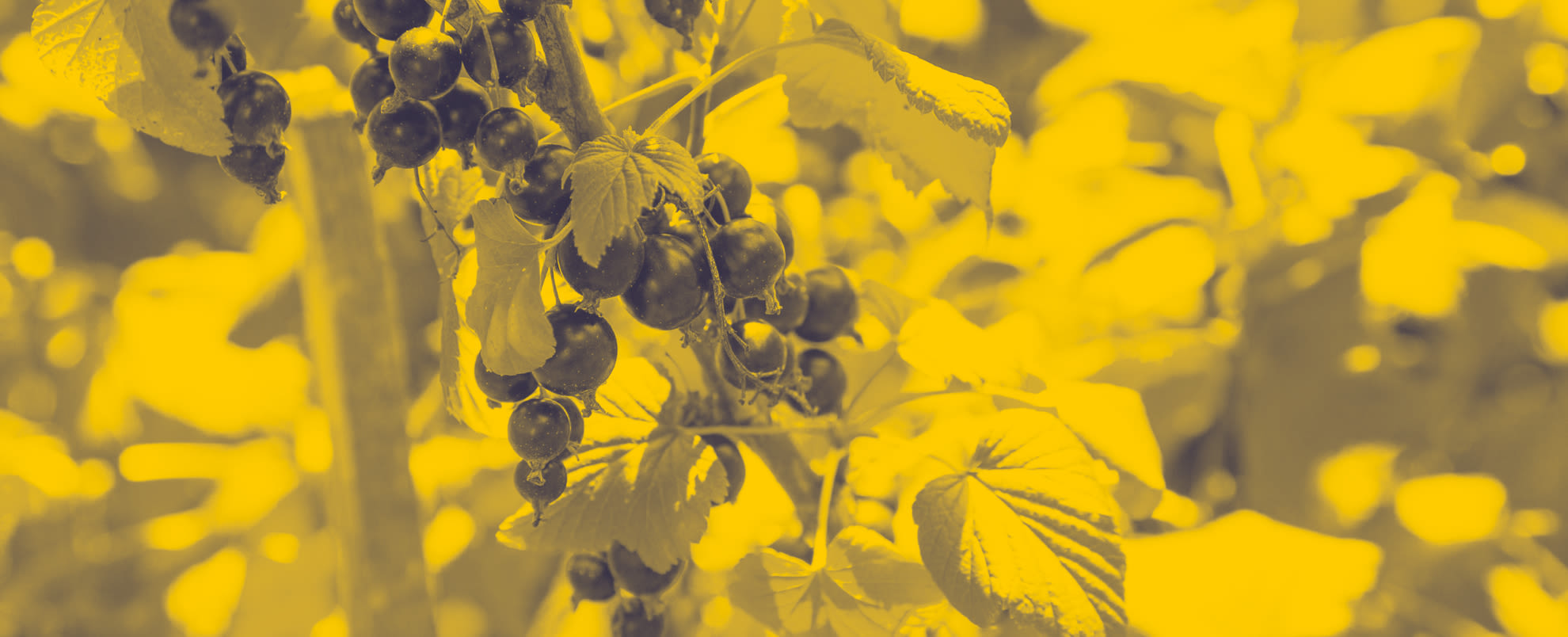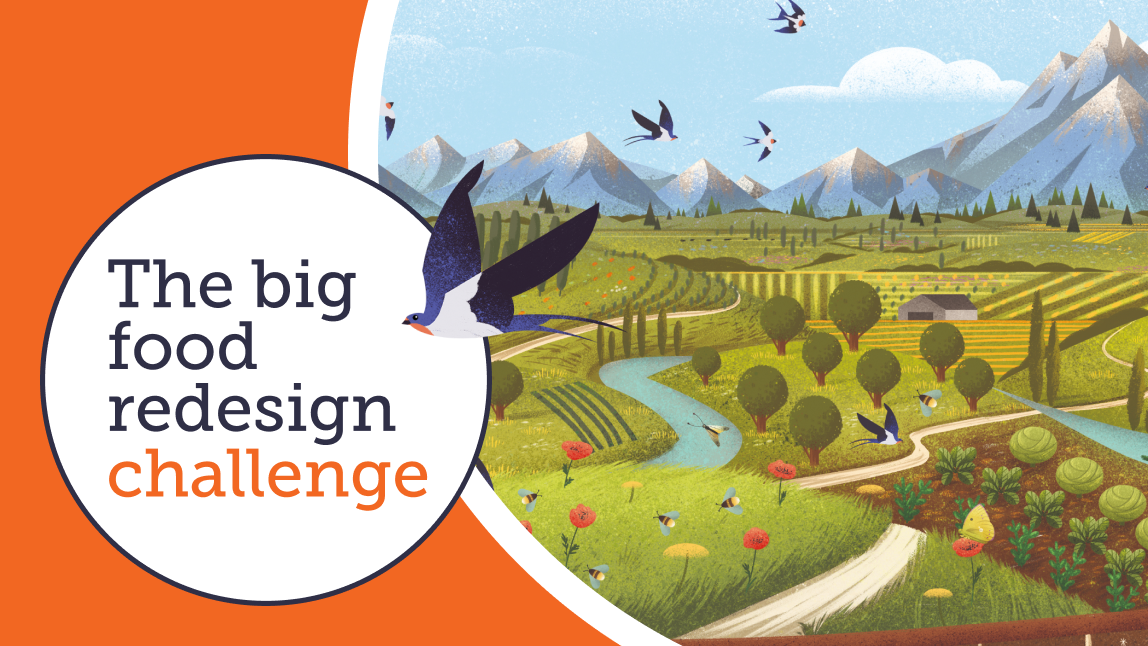This is part of a series of case studies that illustrate how food businesses are creating innovative collaborations in order to regenerate nature.
In Brief
At the heart of the concept of a circular design for food is the idea that food manufacturers and farmers should work in harmony to prioritise nature. Collaborative relationships can benefit the environment and be good for business.
The partnership between beverage company Suntory Beverage & Food GB&I (SBF) and English blackcurrant farmer Rosie Begg is a great example of the positive impacts that can result, for the company, the farm, and the wider landscape of North Norfolk in the UK.
How it started
The story begins in 2019 when Begg moved from London back to her native Norfolk to take over her family’s 148-acre blackcurrant farm. As a corporate partnerships manager for a charity, this was a leap, but she was keen: Gorgate Farm had been run by a manager since her father died and she wanted to get back to her farming roots.
Inspired by all she was hearing about new ways of farming that could yield regenerative outcomes for the land, she wanted to transform Gorgate to protect it and the landscapes around it: “I’m 34 and I’d like to think I’ll be farming for another 34 years. But that means I have to plan for a time when it will be harder to water the plants. We need to look after the soil too so it continues to be fertile.”

SBF GB&I agronomist Harriet Prosser (L) and farmer Rosie Begg (R)
She had another, even more ambitious, motivation. Conscious that farmers can be nervous of literally betting their farm on a completely different way of managing the land, often late in their lives, she wanted to provide a demonstration project. Her vision was to provide visible evidence of the effects of farming regeneratively; somewhere that local farmers could visit and learn from.
Luckily, she also inherited a major customer, and this collaboration was to prove one of the keys to unlocking Begg’s regenerative ambitions. Gorgate has supplied blackcurrants for the production of soft drink Ribena since the 1950s. Now owned by Japan-owned soft drinks company SBF, the brand sources all of its blackcurrant supplies from a network of 34 farms across the UK.
What’s happening?
Begg approached SBF GB&I with a proposal – would they be willing to underwrite her regenerative explorations? The timing was good, as the company was already considering how to future-proof its business by decarbonising its supply chains and working out ways its 34 UK blackcurrant farmers could adapt to climate change.
As Begg observes; “We’re all vulnerable, so it makes sense to work together”.
The company agreed to what Begg describes as a ‘fair risk/reward system” that allows her to experiment with natural methods of fertilisation, refine her compostingcompostingMicrobial breakdown of organic matter in the presence of oxygen. techniques to find the best mix, and how to achieve optimal levels of photosynthesis for the blackcurrant plants. She’s also been exploring novel, non-chemical methods of crop protection, like the use of cinnamon oil to repel aphids, as well as looking at the best cover crops to manage soil erosion and build fertility.
SBF GB&I’s financial support means that Begg can be confident that she will still earn enough of a revenue from her blackcurrant crop to be bold in her bio-chemical experimentation. A minor proportion of her farm remains within conventional production, as back-up during the three-year pilot.
The activity is unique within its sector. The drinks company’s agronomist Harriet Prosser describes the project, which began in April 2023, as “a real shift away from more conventional practices.”
She continues; “The principles are backed by credible science but have yet to be commercially tested in more mainstream perennial fruit systems. The aim is to produce quality data that will enable us to scale up these principles to the wider industry. We’re not just tackling greenhouse gas emissions, we’re looking to increase the amount of microorganisms in our soil, in turn improving soil health and fertility which benefits the blackcurrant itself.”
The effectiveness of the partnership between farmer and customer is also enhanced by other collaborations. Soil samples for the project are analysed by University of East Anglia, while the James Hutton Institute has bred a new variety of blackcurrant plant that is adapted to climate change by not needing long cold periods to grow and bear fruit. This gives SBF’s supply chain some resilience against the effects of climate change.

And then there’s the Wendling Beck Environment Project, a habitat creation, nature restoration, and regenerative farming project spanning 2,000 acres of North Norfolk. This grouping of four farms (including Gorgate) plus Natural England, Rewilding Britain, Norfolk Rivers Trust, and Anglian Water are breaking new ground in how they are working together to bring their landscape back to life. The project uses a new funding mechanism that links demonstrable eco-system improvements to grants from a new fund from the Department of Environment, Food and Rural Affairs, as well as payments from the UK government’s new Environmental Land Management (ELM) scheme. Gorgate’s collaboration with SBF is significant as it aids the farm’s long-term financial viability and hence ability to be a member of Wendling Beck.
The project partners are using various nature-based solutions to improve biodiversity (focusing on boosting habitats for turtle doves), build flood resilience, restore 5km of rivers, and sequester carbon via restoration of land. Wendling Beck is built on a long-term plan of 30 years, but wins have already been recorded – between 2020 and 2022 nitrogen and chemical inputs were halved and phosphate application has stopped entirely.
Why it’s an example of the circular economy
SBF is practising circular design for food via its investment in the creation of diverse species of blackcurrants, and the underwriting of the experiments in regenerative agriculture at Gorgate.
In addition, the partnership between the company and Gorgate Farm provides multiple examples of two of the three principles of the circular economy (eliminate waste and pollution; circulate products and materials at their highest value; regenerate nature).
Gorgate is on its way to eliminating use of chemical fertilisers that pollute the land. Although some are still being used, Begg’s plan is that they will no longer be needed when she has found the right natural techniques to encourage plant growth and dissuade predators. These nature-based ways of farming will regenerate the landscape, protecting and restoring the soil and building back biodiversity.
Lessons learned (so far)
Guaranteeing crop payments helps farmers experiment. This is particularly important in a project of this scale because it enables the farmer to keep paying the bills while trying out new techniques to build regenerative outcomes but might reduce revenue in the short term.
Converting other farmers to regenerative agriculture can be difficult in the short-term, due to the visual effects of the change. “Nature doesn’t like tidiness”, observes Begg, explaining that her hedgerows are now messy as they aren’t cut (preserving habitats) and her farmyard is full of piles of compost. Neighbouring farmers were also “horrified” to see what looked like weeds (actually wildflowers) growing in her lowland meadows. But she remains hopeful that the eventual positive impact on land and revenues will win them over. Gathering evidence is now her focus.





